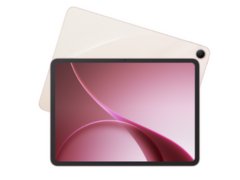- Home
- Tablets
- Tablet Finder
- OPPO Tablets
- OPPO Pad 5
OPPO Pad 5
- OPPO
- Last Updated: 10th February 2026
-
 Display 12.10-inch (2120x3000)
Display 12.10-inch (2120x3000) -
 Processor MediaTek Dimensity 9400+
Processor MediaTek Dimensity 9400+ -
 Front Camera 8MP
Front Camera 8MP -
 RAM 12GB
RAM 12GB -
 OS Android 16
OS Android 16 -
 Storage 256GB
Storage 256GB -
 Rear Camera 8MP
Rear Camera 8MP -
 Battery Capacity 10420mAh
Battery Capacity 10420mAh
OPPO Pad 5 Summary
OPPO Pad 5 tablet was launched on 16th October 2025. The tablet comes with a 12.10-inch touchscreen display offering a resolution of 2120x3000 pixels. OPPO Pad 5 is powered by an octa-core MediaTek Dimensity 9400+ processor. It comes with 12GB of RAM. The OPPO Pad 5 runs Android 16 and is powered by a 10420mAh non-removable battery.
As far as the cameras are concerned, the OPPO Pad 5 on the rear packs 8-megapixel camera. It sports an 8-megapixel camera on the front for selfies.
The OPPO Pad 5 runs ColorOS 16 is based on Android 16 and packs 256GB of inbuilt storage. The OPPO Pad 5 measures 289.61 x 209.66 x 5.97mm (height x width x thickness) and weighs 675.00 grams. It was launched in Galaxy Silver, Space Gray, Galaxy Silver Soft Light Edition, and and Lucky Purple Soft Light Edition colours.
Connectivity options on the OPPO Pad 5 include USB Type-C, Wi-Fi, and NFC. Sensors on the tablet include ambient light sensor, gyroscope, and accelerometer.
As of 10th February 2026, OPPO Pad 5 price in India starts at Rs. 30,999.
OPPO Pad 5 Price in India
| Product Name | Price in India |
|---|---|
| OPPO Pad 5 Tablet (256GB, 12 Inches, 5G, Aurora Pink) | ₹ 30,999 |
OPPO Pad 5 price in India starts from ₹ 30,999. The lowest price of OPPO Pad 5 is ₹ 30,999 at Flipkart on 10th February 2026.
Recommended Alternative
OPPO Pad 5 Full Specifications
| Brand | OPPO |
| Model | Pad 5 |
| Price in India | ₹30,999 |
| Release date | 16th October 2025 |
| Launched in India | No |
| Form factor | Touchscreen |
| Dimensions (mm) | 289.61 x 209.66 x 5.97 |
| Weight (g) | 675.00 |
| Battery capacity (mAh) | 10420 |
| Removable battery | No |
| Colours | Galaxy Silver, Space Gray, Galaxy Silver Soft Light Edition, and Lucky Purple Soft Light Edition |
| Screen size (inches) | 12.10 |
| Touchscreen | Yes |
| Resolution | 2120x3000 pixels |
| Processor | octa-core |
| Processor make | MediaTek Dimensity 9400+ |
| RAM | 12GB |
| Internal storage | 256GB |
| Rear camera | 8-megapixel |
| Front camera | 8-megapixel |
| Operating system | Android 16 |
| Skin | ColorOS 16 |
| USB Type-C | Yes |
| Wi-Fi | Yes |
| Bluetooth | Yes |
| Bluetooth version | 5.40 |
| NFC | Yes |
| Accelerometer | Yes |
| Ambient light sensor | Yes |
| Gyroscope | Yes |
OPPO Pad 5 Competitors
-
 OPPO Pad 5
₹30,999
OPPO Pad 5
₹30,999
OPPO Pad 5 User Review and Ratings
OPPO Pad 5 News
-
 Oppo Reno 15 Series 5G, Oppo Pad 5, and Oppo Enco Buds 3 Pro+ Sale in India Begins Today: Price, Offers
Oppo Reno 15 Series 5G, Oppo Pad 5, and Oppo Enco Buds 3 Pro+ Sale in India Begins Today: Price, Offers -
 Oppo Pad 5 Launched in India With 10,050mAh Battery, 12.1-Inch Display: Price, Specifications
Oppo Pad 5 Launched in India With 10,050mAh Battery, 12.1-Inch Display: Price, Specifications -
 Oppo Pad 5 Will Launch in India Alongside Oppo Reno 15 Series; Flipkart Availability Confirmed
Oppo Pad 5 Will Launch in India Alongside Oppo Reno 15 Series; Flipkart Availability Confirmed -
 Oppo Pad 5 Receives BIS Certification, Suggesting Imminent Launch in India
Oppo Pad 5 Receives BIS Certification, Suggesting Imminent Launch in India -
 Oppo Pad 5 With MediaTek Dimensity 9400+ Chipset, 10,420mAh Battery Launched: Price, Specifications
Oppo Pad 5 With MediaTek Dimensity 9400+ Chipset, 10,420mAh Battery Launched: Price, Specifications
Other OPPO Tablets
Related Tablet Tablets
- Samsung Galaxy Unpacked 2025
- ChatGPT
- Redmi Note 14 Pro+
- iPhone 16
- Apple Vision Pro
- Oneplus 12
- OnePlus Nord CE 3 Lite 5G
- iPhone 13
- Xiaomi 14 Pro
- Oppo Find N3
- Tecno Spark Go (2023)
- Realme V30
- Best Phones Under 25000
- Samsung Galaxy S24 Series
- Cryptocurrency
- iQoo 12
- Samsung Galaxy S24 Ultra
- Giottus
- Samsung Galaxy Z Flip 5
- Apple 'Scary Fast'
- Housefull 5
- GoPro Hero 12 Black Review
- Invincible Season 2
- JioGlass
- HD Ready TV
- Laptop Under 50000
- Smartwatch Under 10000
- Latest Mobile Phones
- Compare Phones
- Samsung Galaxy F70e 5G
- iQOO 15 Ultra
- OPPO A6v 5G
- OPPO A6i+ 5G
- Realme 16 5G
- Redmi Turbo 5
- Redmi Turbo 5 Max
- Moto G77
- Asus Vivobook 16 (M1605NAQ)
- Asus Vivobook 15 (2026)
- Black Shark Gaming Tablet
- Lenovo Idea Tab Plus
- boAt Chrome Iris
- HMD Watch P1
- Haier H5E Series
- Acerpure Nitro Z Series 100-inch QLED TV
- Asus ROG Ally
- Nintendo Switch Lite
- Haier 1.6 Ton 5 Star Inverter Split AC (HSU19G-MZAID5BN-INV)
- Haier 1.6 Ton 5 Star Inverter Split AC (HSU19G-MZAIM5BN-INV)














































